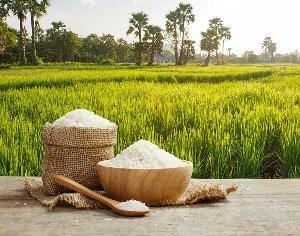Ghana spent a total of GHS 6.8billion (equivalent to US$560 million at current market rates) on rice imports last year.
This is according to data from IDH Sustainable Trade, a foundation headquartered in The Netherlands.
While total rice consumption stood at 1.4 million metric tonnes in 2022, imports valued at US$560 million accounted for 800,000 metric tonnes (mt) of the consumption figure, with domestic production catering for the remaining demand – according to data from IDH Sustainable Trade, a foundation headquartered in The Netherlands.
Similarly, according to the Ministry of Food and Agriculture, between 2010 and 2020 the country’s rice imports hit a staggering US$8billion. This, in addition to imports of other food items that can be produced locally, has been a major source of concern for stakeholders.
This high dependence on imports of food staples like rice, despite vast untapped domestic potential, however comes with ramifications for the cedi and local job prospects, warns Country Director for IDH, Robert Asugre.
Just like many other industry watchers and economists, Mr. Asugre is of the view that rising consumption of the grain presents huge opportunities for real value creation and jobs if the right investments and policies on local production are prioritised.
“The rice value chain in Ghana, when supported, will lead to increased commercialisation and improved production of high quality and quantities that are competitive,” he said. This, he added, will help to reduce the impact of rice imports on the economy.
Mr. Asugre spoke on the sidelines of the National Rice Fair held in Walewale in the North-East Region, and called for greater commitments from government and the private sector to ease the import burden on the economy of rice and other foodstuffs which can be produced locally.
Buttressing his point, he said northern parts of the country alone, for instance, have potential to meet the rice needs of Ghanaians if the right investments into infrastructure – including irrigation systems, milling machines and storage facilities as well as suitable policies – can be put in place.
He added that the result of such investments will have far-reaching impacts on the economy, as it will retain value within as well as creating sustainable jobs for the country’s teeming youth.
Rice has become the second staple food consumed in the country after maize, with production increasing from 48,800mt in 1970 to 925,000mt in 2019; growing at an average annual rate of 9 percent, according to the Food and Agriculture Ministry.
Though the figures depict high potential for growth in local production, challenges including access to finance, skilled labour, shortage of combine harvesters, milling machines and storage infrastructure continuously threaten the crop’s production.
Though one of the first countries in the sub-region to launch the National Rice Development Strategy, challenges still persist – with Ghana having already missed out on its local rice production agenda as part of the Coalition for African Rice Development policy.
That strategy, which was unveiled in May 2008 as the National Rice Development Strategy for the period 2009-2018, aimed at increasing domestic production up to 70 percent and promoting consumption through quality improvement, targetting both local and international markets.
The strategy ended almost four years ago, albeit rather achieving an opposite figure of 70 percent imports with the Ghanaian consuming public still largely dependent on imported rice brands.
Source: Ghanaweb


